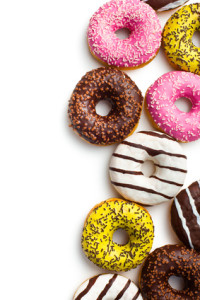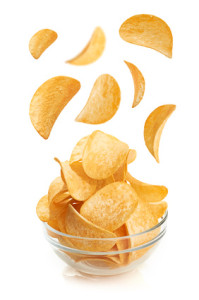 In 2007 a study* found that, ‘Each 2% increase in the intake of energy from trans unsaturated fats, as opposed to that from carbohydrates, was associated with a 73% greater risk of ovulatory infertility’. Now, I’m not a scientist, but it seems to me that these are statistics worth taking into consideration if you’re trying to make a baby.
In 2007 a study* found that, ‘Each 2% increase in the intake of energy from trans unsaturated fats, as opposed to that from carbohydrates, was associated with a 73% greater risk of ovulatory infertility’. Now, I’m not a scientist, but it seems to me that these are statistics worth taking into consideration if you’re trying to make a baby.
So what are trans fats? Trans fats are rare in living nature, but common in food production. They are created when liquid oils are processed into solid fats like hard margarine, or commercial frying fats. Now you may not use margarine or solid frying fat at home, but trans fats are extensively used in processed foods because they extend shelf life and also because they can be used repeatedly without breaking down.
Why are trans fats bad? Well I’m not an expert, but from the research I’ve done, it seems that trans fats are likely to: increase bad cholesterol and reduce good cholesterol; promote inflammation and the formation of blood clots; increase blood pressure; and are linked to increased heart disease, obesity and higher incidence of infertility.
 Health authorities worldwide recommend the consumption of no more than trace amounts of trans fats daily.
Health authorities worldwide recommend the consumption of no more than trace amounts of trans fats daily.
Where might you find trans fats? They can be found in processed foods and particularly in commercial baked goods (cakes, pies, biscuits, crackers, bread, etc), snack food, margarine, sweets and fast foods. Just 4 grams a day could affect fertility! To give you an idea of what that means, a doughnut has around 5grams, a packet of crisps 3 grams, and a portion of french fries 8 grams.
To avoid trans fats in the food you purchase, check the label for hydrogenated or partially hydrogenated fats and shortening. And beware, you may also want to check your salad dressings and breakfast cereal for trans fats!
Of course, not all fats are bad, so make sure you get your daily dose of omega 3, 6 and 9 fats: substitute your crisps or crackers for flaxseed or walnuts and swap your pies for fish.
And this warning isn’t just for the ladies: trans fats have also been implicated in lower sperm count and quality, as sperm cells can be extremely sensitive to diet and toxins.
But not everyone agrees with this research, Marion Nestle Phd, Professor in the Department of Nutrition, Food Studies and Public Health at New York University is reported to have said, “I am always sceptical when I hear the claim that a particular food or food component has a very large impact on health.”
Given that foods containing trans fats seem to be on the unhealthy list anyway, I’d say it’s sensible to avoid them and go for options containing the healthier omega 3, 6 and 9 fats. And if you can get the man in your life to give up crisps, crackers, cakes and sweets, even better.
*American Journal of Clinical Nutrition, Jan 2007 ,”Dietary fatty acid intakes and the risk of ovulatory infertility.” Chavarro JE, Rich-Edwards JW, Rosner BA, Willett WC.
